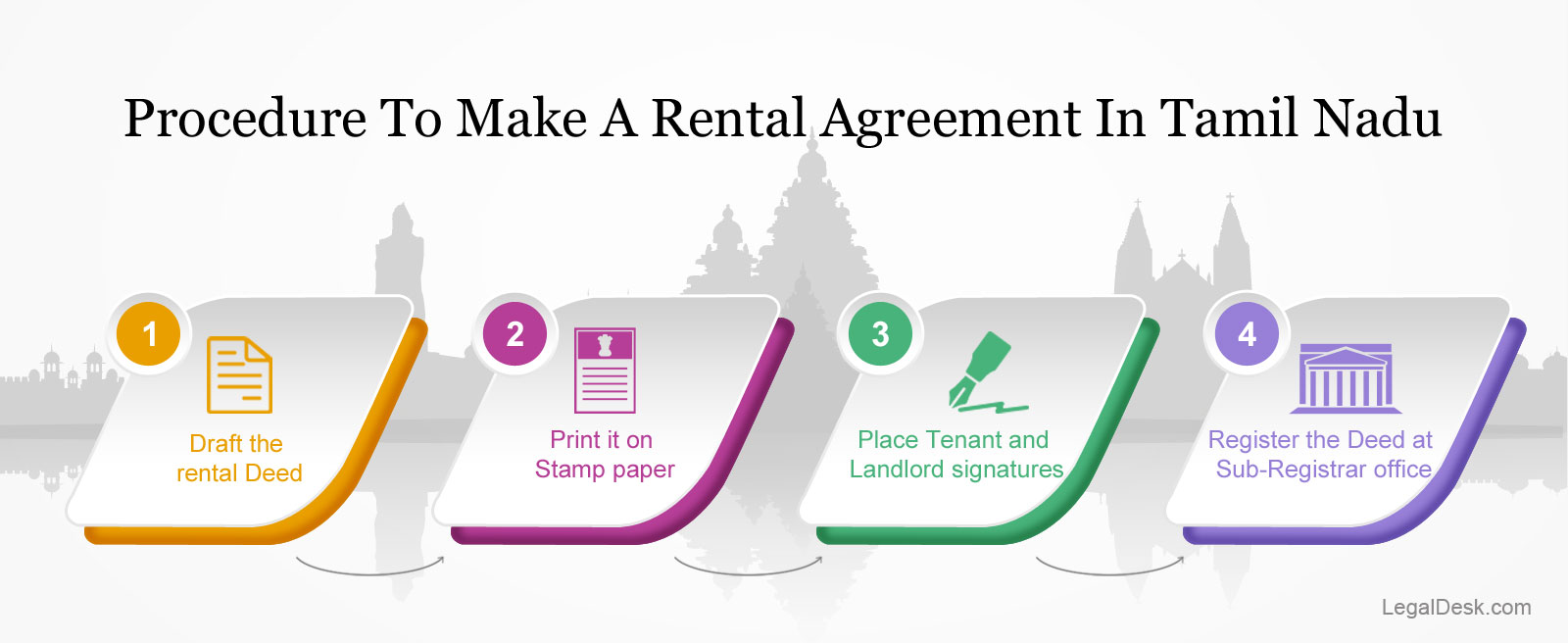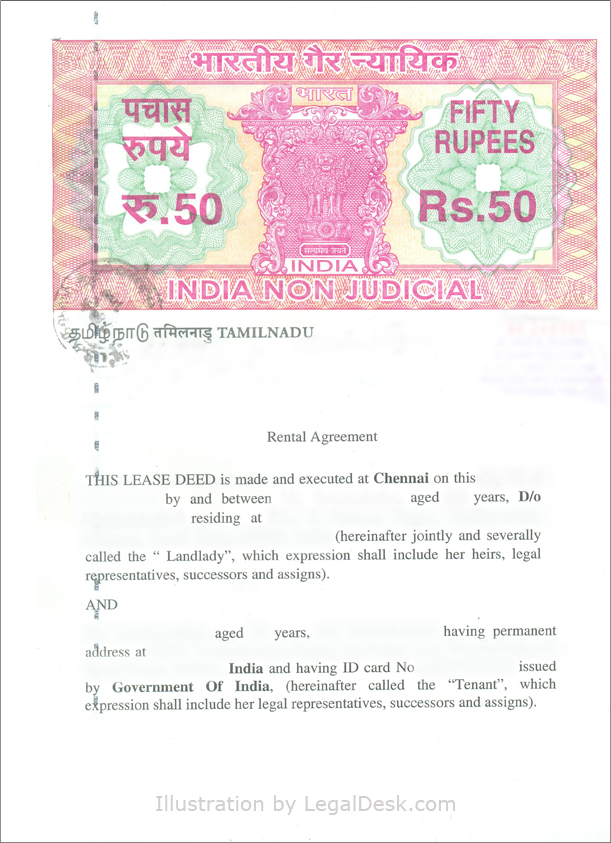Tamil Nadu needs no introduction. This historically rich state is well known for its beautiful temples, vibrant culture and of course the pointless Madrasi jokes we hear in movies. Its capital city, Chennai is a bustling hub of activities.
From an horde of MNCs to ancient temples, Chennai has got it all. Hence, it is no big surprise that a good number of educated people migrate to cities like Chennai and Coimbatore mostly for jobs, this in turn has increased the demand for rental properties there. Which brings us to the point of this article, how do you make a rental agreement in cities of Tamil Nadu?
Procedure To Make A Rental Agreement In Tamil Nadu
- Prepare your rental agreement after discussing clauses with your Tenant/Landlord
- Print the draft on stamp paper of due value
- Place signatures of Landlord and Tenant at designated places along with signatures of two witnesses
- Register the Deed at local Sub-Registrar office

Preparing The Agreement
To prepare a rental agreement, first create a draft version after discussing the clauses with your Landlord/ Tenant. There are some clauses that must never be omitted from a rental agreement, which will be discussed later on in the article. Add all the details you want and once the draft is ready, review the deed. Purchase Stamp Paper of recommended value, which would depend on your rent and deposit amounts. Finally, print your deed on stamp paper. Main cities like Chennai, Coimbatore, Salem etc are in the habit of using elaborate agreements, while smaller cities like Madurai, Tiruchirapalli, Tirunelveli etc are more lenient.
Doing this might sound like a great hassle, but now you can use online rental agreement services. LegalDesk provides ready-to-use, lawyer verified, online rental agreement. You can use them to create an agreement in a matter of minutes.
Stamp Duty Requirements

Stamp Duty is essentially a form of tax levied on legal documents in return for making them legally effective. In Tamil Nadu, the Stamp Duty paid for rental agreements is usually 1% of rent+deposit amount irrespective of the lease term.
Usually for rental agreements for period below 11 months, twenty rupees Stamp papers are used. Above 11 months it depends on the amount of annual rent plus security deposit. 1% of the total amount is the Stamp duty.
If the required stamp duty is not paid, should any dispute arise and matters go to court, parties involved may have to pay almost ten times the actual Stamp Duty.
e-Stamping In Tamil Nadu
e-Stamping is widely practiced in Chennai while it is not so much in use in the other cities. Easily available at several places throughout the city, e-Stamp Papers were launched in late 2010 and is now a popular choice. As of now they are issued and regulated by the Stock Holding Council of India Limited (SHCIL). They are tied up with various banks to provide e-Stamp Paper to the general public.
Registration Of Agreement
Registering a document means recording a document’s contents with an authorized office/ official. This provides advantages that just cannot be overlooked. For starters-
- Registration puts a document in the public domain, preventing forgeries and frauds from happening.
- It proves that the document was indeed prepared and signed by parties involved in the deed and provides clarity and transparency.
- Every matter related to the property/ entity mentioned in the document becomes clear. Which means feuds, debts and liabilities are revealed.
In Tamil Nadu, registration charges are somewhere close to INR 10,000.
Documents to be presented by the Landlord for registration –
- Original copy of proof of ownership or title to property
- Two (2) recently taken passport size photos
- Aadhar card or its receipt while applying for it is mandatory
- Any Govt issued ID proof – driving licence, voter’s ID, passport etc
- The rental agreement printed on the Stamp paper of recommended value
Documents to be presented by the Tenant for registration –
- Two (2) passport size photos
- Aadhar card or the receipt received while applying for it, if the person is Indian. If the person is not an Indian national, then his/her original passport is required.
- A board resolution/ authorisation letter from the company mentioning the person’s right to register the lease, along with the company seal, if the tenant is a registered Company
- If one person is representing another person for the registration, then a Power of Attorney should be presented.
Types Of Rental Agreements Commonly Used
- 11-Month Tenancy Agreement – Probably one of the most widely used rental agreements throughout the country. This type of agreement lasts precisely 11 months and is renewable at the end of term. Registration is generally omitted for such agreements owing to their short duration.
- Commercial Lease – Signed for business purposes between landlords and business or between two businesses, commercial leases are the kind of deed that have no preset format. These documents can be drawn up to adapt to the needs of both parties and are often signed for longer periods of time. Registration and notarization are rarely avoided for such documents as consequences could be harsh.
- Long Term Lease – Signed mostly for residential needs, long term leases involve a large lump sum paid upfront instead of monthly rent payments. As it involves a large amount of money, they are registered and notarized duly.
Important Clauses To Include In Your Rental Agreement
Omitting certain vital clauses in your rental agreement leads to unpleasant legal battles should a disagreement arise between Tenant and Landlord. Even if both parties know each other, it is ideal to draw up a comprehensive agreement to cover your backs.
Here are some of the clauses that should never be omitted-
- Rent, maintenance charges and security deposit – Values of these must be clearly spelled out in the contract to prevent both parties from backing out on their word.
- Pets – Whether or not animals are allowed in the premises must be discussed and agreed upon in advance.
- Penalty for late payments – Landlords are free to place a penalty on delayed rent payments. Details about the consequences of late payments must be clearly stated in the deed.
- Cleaning and painting – If Landlord cleans and paints the home freshly before the Tenant moves in, the charges will be deducted from the Tenant. So the deed must clearly state that charges for painting and cleaning will be cut from the security deposit.
- Lock in period – This refers to the minimum duration for which the deed cannot be terminated by both parties.
- Consequences of overstay – If the Tenant continues to occupy the property even after the contract ends, Landlord can decide the penalty for it. Such a penalty should be detailed in the deed.
- Food habits – Landlord must mention his rules on food habits that can be practised within his property.
Things To Keep In Mind While Renting
If disagreements occur in the future, the rental agreement is going to be a focal point of the legal battle. However, there are some other factors which when overlooked can cause bigger troubles. Here are some things that you must keep in mind-
- Authenticity of the owner – Sometimes, caretakers or Tenants themselves might pretend to be the owner and try to rent out/ sublet the place. Make sure that the guy claiming to be the owner actually has the documents to prove it.
- Receipts for payments – Collect receipts for every payment you make. Be it the token advance or monthly rent, everything requires a receipt.
- Painting and maintenance – It is a common trend to deduct painting charges from the security deposit amount when the tenant vacates the property. However, if the house was not painted while the tenant moves it, the landlord does not have the right to deduct painting charges from the security deposit.
- Registration – Unless your deed is registered it can only serve as collateral evidence should a dispute arise.
Security Deposit – Security deposit is a certain amount of money collected in advance from the Tenant to avoid losses to the Landlord due to non payment of rent or damages to the property. The amount is usually few months worth of rent and is refundable at the time of returning keys to the Landlord.
Token Advance – Token advance refers to a small sum of money paid by the tenant to the landlord prior to the signing the rental deed. The idea is to prevent the Landlord from letting other potential tenants from developing an interest in the property. Once the token advance is paid, the deal is considered final. If one party decides to backout, he/she is liable to compensate for the losses incurred by other party.
Making Your Rental Agreement Online
Now you can create your own rental agreement online by following these steps:
- Visit link provided for Pre-drafted Rental Agreements
- Fill in the details of both Landlord and Tenant
- Customize/ add clauses of your choice to the existing clauses
- Add details about monthly rent, maintenance charges and security deposit
- Review your document, make payment.
- Opt for printing a soft copy or allow us to print the deed stamp paper and deliver to you at a nominal fee

 Request Customized Document
Request Customized Document 